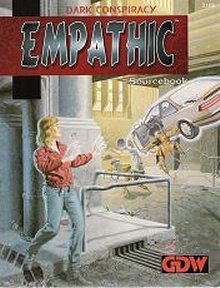
The Introduction lays out how this book is designed to expand the basic Empathy ability. There are different disciplines which may be learned: the neuropathic, the psionic, the sorcerous, and the mystical. Only the neuropathic discipline can be acquired without the need for study and training. It equates to the default Empathy ability in the core rules, and is regarded as the most dangerous form of empathy to use, even if it is easier to acquire. The other disciplines can be studied during character generation (by taking one or more term to do so) or once play has started if the character can find a teacher. The study of psionics and mysticism is incompatible, you have to choose one or the other.
The first chapter, however, deals with a system change, from the original D10-based system to a D20 one. It explains in detail how to create new characters, or convert existing ones and then goes on to explain how the new rules work in play. This isn't the 'D20' system of Dungeons & Dragons 3e, by the way, but a revision of the D10 system to use twenty-sided dice. It's something that was introduced in Twilight 2000 and the rest of the GDW games with a common ruleset.
Next up is Empathic Background. This talks about the degeneration of the world and the part, unnoticed by the vast majority of people, that Dark Minions have played in it. Although most people haven't noticed, some have and they form a loose 'empathic underground' to combat the threat. As your party finds out more, they will become aware of the empathic underground if not part of it - even those characters with all the empathy of a house brick. Many groups of empathic people have existed long before the Dark Minions arrived on the scene - there have long been those who study esoteric arts, alchemy and the like. The chapter continues with an analysis of the different groups that can be found, with suggestions as to how to involve them in play. There's also a random generation system in case you need a group in a hurry along with some sample groups, then the discussion moves on to the relationships of the empathic underground with ETs. Notes on playing ETs for the Referee and some ET careers follow.
The rest of the book consists of chapters on each empathic discipline: neuropathy, psionics, sorcery, and mysticism. Background, its place in the world, new skills and abilities, they're all here. They make for fascinating reading and open up whole vistas of new ideas and potentials for characters and plotlines alike. There are extensive details on training and how to acquire it, different abilities and levels of power... pretty much all you need to know. The Referee may want to allow interested players to read up on their chosen discipline or may prefer to reveal the material herein during play - particularly for those characters who seek training during the course of the game.
You should definitely get this book and incorporate it into your game if you want to tap into the full 'otherness' of empathic powers. Whether or not you let your players use them is another matter, these may be part of the weird and sometimes scary that more 'ordinary' characters slowly become aware of as they investigate strange goings-on... and, of course, they may have opportunities to learn these powers for themselves in due course.
Return to Empathic Sourcebook page.
Reviewed: 20 October 2017

